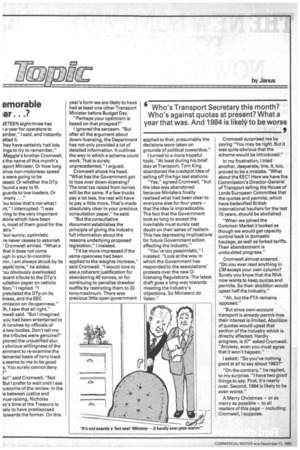7Tco ficca by Janus
Page 34

If you've noticed an error in this article please click here to report it so we can fix it.
Who's Transport Secretary this month? Who's against quotas at present? What a year that was. And 1984 is likely` to be worse
9
emorable iar. .?
JETEEN eight-three has la year for operators to amber," I said, and instantly etted it.
'hey have certainly had lots ings to try to remember," Maggie's brother Cromwell. e the name of this month's 'sport Minister. Or how long since non-motorway speed :5 were going to be
3ased. Or whether the DTp Found a way to fit guards to low loaders. Or many ..."
'ou know that's not what I nt," I interrupted. "1 was 'ring to the very important sions which have been n, most of them good for the stry."
'our sunny, optimistic re never ceases to astonish 'Cromwell smiled. "What a that it does not come ugh in your bi-monthly rnn. I am always struck by its )eptic tone," he added. 'ou obviously overlooked .ecent tribute to the DTp's 1.11tation paper on vehicle tion," I replied. "I
jratulated the DTp on its kness, and the EEC tmission on its openness." NI, I saw that all right," nwell said. "But I imagined you had been entertained to ;h lunches by officials of e two bodies. Don't tell me the tributes were genuine?" 4nored the unjustified slur. 3 obvious willingness of the ernment to re-examine the lamental basis of lorry track s seems to me to be good s. You surely cannot deny ?"
do!" said Cromwell. "Not But I prefer to wait until I see )utcome of the review. In the le between justice and nue-raising, Nicholas ey's time at the Treasury is (ely to have predisposed towards the former. On this year's form we are likely to have had at least one other Transport Minister before Budget Day.
"Perhaps your optimism is based on that prospect?"
I ignored the sarcasm. "But after all the argument about down-licensing, the Department has not only provided a lot of detailed information. It outlines the way in which a scheme could work. That is surely unprecedented," I argued.
Cromwell shook his head. "What has the Government got to lose over down-licensing? The total tax raised from lorries will be the same. If a few trucks pay a lot less, the rest will have to pay a little more. That's made absolutely clear in your precious consultation paper," he said.
"But the consultative document establishes the principle of giving the industry full information about the reasons underlying proposed legislation," I insisted.
"I'd be more impressed if the same openness had been applied to the weights increase," said Cromwell. "I would love to see a coherent justification for abandoning 40 tonnes, or for continuing to penalise drawbar outfits by restricting them to 32 tons maximum. There was precious little open government applied to that; presumably the decisions were taken on grounds of political cowardice."
I turned to a more hopeful topic. "At least during his brief stay at Transport, Tom King abandoned the crackpot idea of selling off the hgv test stations.
"Yes," agreed Cromwell, "but the idea was abandoned because Ministers finally realised what had been clear to everyone else for four years — that the idea is impracticable. The fact that the Government took so long to accept the inevitable must surely cast doubt on their sense of realism. This has depressing implications for future Government action affecting the industry."
"You're too pessimistic," I insisted. "Look at the way in which the Government has responded to the associations' protests over the new 0licensing Regulations. The latest draft goes a long way towards meeting the industry's objections. So Ministers do listen." Cromwell surprised me by saying "You may be right. But it was quite obvious that the scheme would be introduced."
In my frustration, I tried another, desperate, line. It, too, proved to be a mistake. "What about the EEC? Here we have the Commission's Director-General of Transport telling the House of Lords European Committee that the quotas and permits, which have bedevilled British international hauliers for the last 15 years, should be abolished.
"When we joined the Common Market it looked as though we would get capacity control back in domestic haulage, as well as forked tariffs. Their abandonment is undoubted progress."
Cromwell almost sneered. "Do you ever read anything in CM except your own column? Surely you know that the RHA now wants to keep quotas and permits. So their abolition would upset half the industry."
"Ah, but the FTA remains opposed."
"But since own-account transport is already permit-free their interest is limited. Abolition of quotas would upset that section of the industry which is directly affected. Hardly progress, is it?" asked Cromwell. "Anyway, even you must agree that it won't happen."
I asked: "So you've nothing good at all to say about 1983?"
"On the contrary," he replied, to my surprise. "I have two good things to say. First, it's nearly over Second, 1984 is likely to be even worse."
A Merry Christmas — or as merry as possible — to all readers of this page — including Cromwell, I suppose.












































































